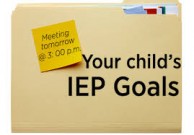By Katherine Carol
Can an Individualized Education Plan (IEP) be compared to a marriage license? Yes, it can.
Think about it, both are legal documents. Once signed, both documents often disappear, one into a file at the county court house, the other locked into a file cabinet in a little room at the local school and more often than not, thrown onto a pile of paperwork at the family home.
By themselves, both the marriage license and the IEP are legal protection and binding agreements focused on the rights and responsibilities of the relationship and each party operating much like a contract.
A marriage license protects a couple in the areas of finance, property, children, medical information and other benefits. An IEP protects a student’s right to a free and appropriate education in the Least Restrictive Environment (LRE), provides for supplementary aids and services needed to assist a student in their educational program and delivers an assessment to determine their specific needs with parental consent.
Focus just on the legal aspects of marriage or an IEP and each becomes lifeless, void of commitment and heart. Treat an IEP like a box to be checked at a bureaucracy-driven meeting in a non-descript meeting room, the stage is set for Due Process, an IEP’s version of divorce. Ugly sets in, people take sides, leaving the student to flounder and fail.
However, put the power of true partnership behind the legal protections and watch lives change. Students grow, brighter futures are nurtured. Everyone benefits. Insert H.O.P.E. and relationships grow, ideas blossom and communities of support take root.
Think of an IEP’s as a sacred contract between student, parent, and educator. The creative process which flows through all of us is the sun, the water and the fertile soil where goals and objectives, once dry, barren and struggling, become vibrant and effective.
Wondering how to rekindle your IEP? Once you understand the basics of the IEP, it is time to focus on intent. And, that starts with vision.
Even if you don’t know the details yet, focusing on a simple vision like my child deserves a “Full Life” not a “half empty, barebones, back of the school life”. Teachers need direction, a target and the more inspiration and ideas you can give them the more they able to target available educational resources in the direction of dreams rather than desperation.
A successful marriage is based on common goals and dreams. Couples who work together, sharing responsibilities and resources, working through communication challenges, respecting one another while honoring individual contributions. The relationship begins to flounder when participant’s motivation is asset protection, withholding important information or a desire to avoid conflict by passive non-participation.
Much is the way a marriage is rekindled, the first steps rekindling an IEP are to commit to it. Next step, understand the relationship with your team is more intimate than intellectual. Put down your guard and make it a parental priority. And, please, treat each member of the team with respect.
As an early special educator, I wrote my first IEP decades ago and without the daily pressures that teachers today have placed upon them in today’s educational environment. As Mikelle’s parent, it wasn’t long before I realized I had much more information about my daughter, what she could do and where she wanted to go than the teachers, therapists and other professionals on the team.
But, they possessed something, I didn’t. Resources. If Mikelle and I could open their hearts to our vision, they could unlock resources, some they didn’t even know they had. We did. She graduated outstanding senior at East High School right in the heart of Denver.
Instead of an hour a year for the annual IEP, the team devoted two hours a month. Each person working to help Mikelle meet her goals for the year and her life. The teachers grew in their expertise, their understanding of the unique opportunities of educating someone with significant disabilities and even gained resources for the school community that only could be gained from Mikelle’s IEP. (A new elevator.)
We used these principles to help Mikelle get her first jobs while still in school. We were able to extend the vision to teachers and students in regular education as the Journalism Department has students write about Mikelle and her goals for the school newpaper as a front page article, we connected to students who needed extra credit for their college applications to help her design her PowerPoint presentations. Ultimately, the IEP jumpstarted her leap into adulthood by helping her start her own business and buy her own home. We did it as team, a community and that is foundation for the website we created: www.TheShiningBeautifulSeries.com.
Marriage needs time and attention. It has be a sacred priority in a couple’s life and so does your student’s education.
Here are some quick tips for rekindling an IEP.
Initiate positive story telling time.
Start at the dinner table, while doing errands in the car or at the local coffeehouse. Teach your student to tell positive stories about their accomplishments. These stories fuel the vision and demonstrate action and accomplishment. The accomplishments don’t need to be big, they have to show interest and engagement.
Reach out to your educational team. Your individual educators are people not processes or systems. Connect to their interests, find out their successes, what you have in common and what they personal and professional vision is headed. And, send “Thank You’s and so appreciation. Relationship 101—use your heart.
Have fun. You love your child. Make an IEP a fun event. The rest of the team will follow suit. They may leave their professional hats on but, most of them will appreciate the effort.
Offer your expertise and understanding as a parent.You are a reservoir of experience and knowledge when it comes to your student. Share your ideas and connections.
Lead with kindness. And, if none the above seems to work, bring in an advocate or mediator.
Additional Resources:
US Department of Education
http://www2.ed.gov/parents/needs/speced/iepguide/index.html
National Association of Special Educators
https://www.naset.org/3321.0.html
Center for Parent Information and Services
http://www.parentcenterhub.org/repository/pa12/
From Emotions to Advocacy, Peter W. D. Wright



